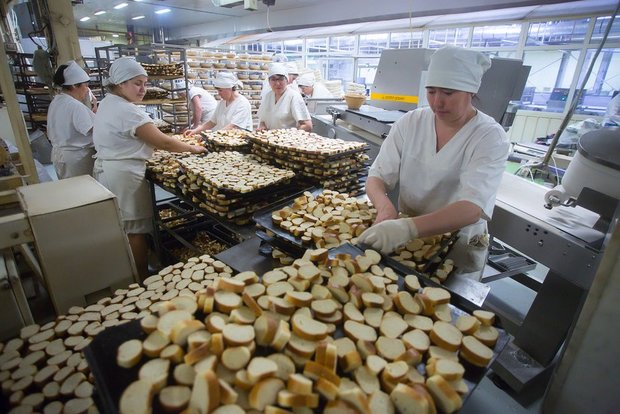‘We will keep the prices as long as we can’: bread bakeries hit the ceiling on social bread price
Kazan bread bakeries have raised prices by 2 rubles in the expectation of federal subsidies, which is the compensation the Russian Ministry of Agriculture offers
Federal authorities are imposing measures of financial support to stabilise retail prices for bread in regions for the first time in 10 years. In exchange for the commitment to freeze prices, Tatarstan will get 114,2 million rubles, which will be spent to directly subsidise flour mills and bread bakers — 2 rubles per kilogram of sold bread. In the expectation of subsidies, the Tatarstan government had to stop republican subsidies from January, which was 3-4,5 rubles for social breads, a source in the sector said. “There is neither this nor that [money],” head of Kazan Bread Bakery Bulat Kutdusov confirmed to Realnoe Vremya. Meanwhile, the price for social bread in Kazan stores has hit the ceiling and approach more expensive breads.
114,2 million to stabilise prices for Tatarstan bread
Along with other Russian regions, Tatarstan is preparing to sign an agreement on stabilisation of bread prices as a socially important number one product with the Russian Ministry of Agriculture. According to the Russian government’s decree signed by Prime Minister Mikhail Mishustin this Saturday, the republic will get 114,2 million rubles to pay for a shortfall in incomes of the bread baking industry by fixing retail prices.
According to the document, 65,9 million rubles will be allocated to help flour mills of Tatarstan that, in turn, will have to sell flour to bread bakers at a fixed price.
Last year, wholesale flour prices were record high. Bread bakeries will receive another 48,3 million rubles, they promise to bake and sell bread at a fixed recommended retail price. This help is designed for the first quarter of 2021. Tatarstan received the biggest amount of subsidies compared to other regions — only Ural regions are ahead (Moscow and Saint Petersburg aren’t on the list).
A manufacturer himself will decide what types of bread and pastry will be subsidised by the federal budget, Realnoe Vremya was explained in the press service of the Russian Ministry of Agriculture. But there is a mandatory condition indicated in the Russian government’s decree. A subsidised product must have a short shelf life — no more than 5 days. To put it simply, bread bakeries will get subsidies only for fresh bread.

Federal subsidy turns out twice smaller than republican
Compensations of 2 rubles per 1 kg of sold bread, not just produced bread, will be paid, the Tatarstan Ministry of Agriculture and Food explained. The more a bread bakery sells, the bigger amount of subsidies it will get from the common republican wallet. Manufacturers will have to attach sales numbers to applications for a targeted subsidy. In other words, the federal support is aimed not at a small range of social breads like it was previously but more popular breads of different manufacturers. However, it turned out to be 1,5-2 times smaller than the republican support: 3-4,5 rubles per kilo. The group of receivers hasn’t been determined yet.
“Different options are discussed: to give subsidies only to social bread bakers or apply it to private bakeries too that couldn’t use them earlier,” the ministry’s press service said.

According to him a bakery carries the biggest loss from its production and intends to monthly get up to 3,6m rubles of federal subsidies. According to him, the retail price for consumers won’t change.
The Russian Ministry of Agriculture is given 20 days to sign agreements with supreme executive power agencies of Russian regions to provide intergovernmental transfers, the Russian government’s decree reads. On 25 January, the management of the federal ministry had the first meeting with Tatarstan.

Putin: “People tighten their belt because they don’t have money for staples”
The federal authorities began to think about freezing prices for staples at the height of the pre-New Year high demand for foodstuffs. But the Kremlin’s furious reply stopped the habitual pre-holiday rise in prices. Two weeks to New Year, the head of the country held a meeting with the government’s economy arm where he severely criticised the government for the incredible growth prices for staples. A 30% growth of prices for sugar and vegetable oil turned out to be especially outrageous.
“People tighten their belt because they don’t have money for staples. What are you looking at? This is the question. This isn’t a joke,” Vladimir Putin was angry. “When unemployment is growing, incomes are reducing, staples are going up in price so much, while you are telling me a tale here,” he interrupted a report of Minister of Economic Development Maksim Reshetnikov.
A couple of days after the severe criticism, federal agencies announced their readiness to start regulating prices for products by fixing the highest price. By the government’s interim estimates, wholesale prices for sugar can’t exceed 36 rubles per kilogram, while retail prices must be 45 rubles per kilogram. Sunflower oil can be more expensive than 95 rubles and 110 rubles respectively.
Though New Year holidays are behind, prices on stores’ shelves calmed down a bit, but the president’s instruction is still in force. However, the idea of frozen prices went further bypassing sugar and oil manufacturers.
It became known as early as 18 December that the Russian government was preparing radical measures to compensate for costs on bread baking due to a rise in prices for eggs, sugar and oil.
It was decided to pay 2 rubles of subsidy because rye and wheat bread became 6% more expensive, while wheat bread did 4%, which is enough to regulate with this sum. According to calculations of the Russian Ministry of Agriculture, the amount of support for small enterprises that bake around 15 tonnes of bread a day will be about a million rubles a month, for big enterprise (from 60 tonnes of products a day), it will amount to over 3,6 million rubles. The money will be given to receivers according to the agreement signed between the Ministry of Agriculture and regional authorities.
Domestic subsidies are temporarily suspended
While the federal authorities were looking for striking a happy medium to stabilise prices for bread, the Tatarstan Ministry of Agriculture and Food had to suspend the mechanism of republican funding of bread baking.

According to him, Bread Bakery bakes up to 60 tonnes of social bread a day, which is available for consumers with low incomes. Director General of Vasilyevo Bread Bakery Alexander Marchenko added that last year their bakery received republican bakeries — 3 rubles per kilo of social bread (they make 2 tonnes a day).
Bread is 2 rubles more expensive — the exact sum of federal support
As Realnoe Vremya found out, on the eve of the cancellation of republican subsidies, Tatarstan bakeries had to raise bread prices by 2 rubles, or nearly 10%. So since 28 December, Country Bread that weighs 650 grams has increased from 32 to 34 rubles, Ukrainian made of rye flour has risen from 36 to 38 rubles. The prices increased last time in March: from 30 to 32 rubles. Moreover, prices without surcharge are in force only signature stores of bread bakers. In other stores, a surcharge can be from 15 to 50%.
“We raised prices in November as soon as flour suddenly rose,” Alexander Marchenko told Realnoe Vremya. However, he added that Vasilyevo Bread Bakery hadn’t change prices in the last three years. “We hardly made out ends meet. Understanding that bread is a basic product, we kept the prices. But for some reason, both those who are poor and those who drive a Mercedes buy it for a social price.”
The speaker noted social injustice and offered to introduce targeted help. Head of Bread Bakery Bulat Kutdusov claimed that prices for social breads changed depending on the amounts a partner purchased:
“We have more than 2,000 clients whom we supply bread for sale. And they have different prices depending on shipping amounts. The more the batch is, the lower the price is,” he explained.
According to him, prices “certainly weren’t raised” for big chain stores, while “there might be some rise” for individuals. “Federal chain stores have fixed prices now. They can receive bread for some price from us and reduce it themselves. We have seen this,” he was surprised. “In the city in general we see a surcharge from 5 to 50%. I see 20 different prices for our products. I don’t even know how they fix them. I know that Auchan has the lowest surcharge, it is 5%. They really hold it, sometimes it is even zero. While the others seem to look at the market. But we don’t influence the price on the shelf.” In turn, the head of Vasilyevo Bread Bakery also complained that chain stores dictate retail prices for the consumer, not producers.